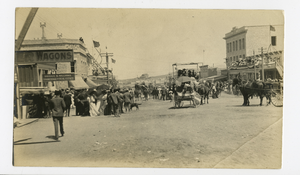Search the Special Collections and Archives Portal
Search Results
Rozita Lee oral history interviews
Identifier
Abstract
Oral history interviews with Rozita Lee conducted by Stefani Evans, Cecilia Winchell, Kristel Peralta, Vanessa Concepcion, Jerwin Tiu, and Su Kim Chung on June 1, 2021, April 12, 2022, and May 18, 2023 for Reflections: The Las Vegas Asian American and Pacific Islander Oral History Project. Rozita shares her experiences growing up on a sugar plantation with her family in Hawaii. She talks about the benefits her family received and the "privileged" life she led with her father as the plantation boss, allowing her household to have electricity, plumbing, and a telephone. Rozita discusses her use of Pidgin English amongst her peers and "good English" in her household, and the roles and responsibilities her parents had working on the plantation. She shares what life was like day to day and what she remembers growing up during World War II including hearing air raid sirens and hanging blackout curtains in her home. Rozita also talks about meeting her husband, Clifford Lee, in high school, their marriage in 1979, and how the couple came to move to Las Vegas. In the second interview, Lee discusses pursuing a bachelor's degree at the University of Nevada, Las Vegas (UNLV), working with Governor Miller and Bob Bailey, and her involvement in a Polynesian show at Imperial Palace for eighteen years.
Archival Collection
Law Day, undated
Level of Description
Archival Collection
Pagination
- Previous page ‹‹
- Page 2
Archival Component

Transcript of interview Hobert D. Blair by Arnel Wilks, March 10, 1975
Date
Archival Collection
Description
Text

Photograph of the Labor Day Parade in Tonopah (Nev.),1905
Date
Archival Collection
Description
Image
Vernon S. Caples oral history interview
Identifier
Abstract
Oral history interview with Vernon S. Caples conducted by Cheryl Caples on February 25, 1979 for the Ralph Roske Oral History Project on Early Las Vegas. Vernon S. Caples (born August 7th, 1891 in St. Johns, Oregon) discusses the history of Las Vegas, Nevada. Vernon describes what Las Vegas was like in the early days, from the Red Light District to the Nellis Air Force Base. He also mentions the implementation of a government program that was set in place to aid senior citizens living in Las Vegas.
Archival Collection
Esther Horner oral history interview
Identifier
Abstract
Oral history interview with Esther Horner conducted by Maureen Brannon in approximately 1977 for the Ralph Roske Oral History Project on Early Las Vegas. Horner discusses the inaugural Helldorado Parade, her family’s establishment of B & H Grocery in Las Vegas, Nevada, atomic tests, presidential visits, social clubs, and the tragic death of actress Carole Lombard in a plane crash in Nevada. Horner also offers insight into religious life, the red-light districts, including the infamous Block 16, racial segregation, and gambling in the early days in Las Vegas.
Archival Collection
Bertha Gresh oral history interview
Identifier
Abstract
Oral history interview with Bertha Gresh conducted by Gary Eagleson on November 30, 1974 for the Ralph Roske Oral History Project on Early Las Vegas. Gresh discusses the history of Las Vegas, Nevada. Gresh then talks about mining and offers details surrounding specific mines, such as the Black Hawk Consolidated or Ran [Rand] Mine, the Techatticup Mine, the Wall Street Mine, and the Duncan Mine. Gresh then discusses the early days of Boulder City, Nevada and Henderson, Nevada. She also briefly mentions Block 16.
Archival Collection
Woodrow Long oral history interview
Identifier
Abstract
Oral history interview with Woodrow Long conducted by Ana Humphrey on October 05, 1979 for the Ralph Roske Oral History Project on Early Las Vegas. In the interview, Long discusses his early life in Panaca, Nevada, his mining job in Pioche, Nevada during the 1930s and 1940s, as well as his eventual move to Las Vegas, Nevada in the 1940s. Long also discusses building Boulder (Hoover) Dam power lines and constructing Las Vegas housing. Long also briefly discusses his education at the University of Nevada, Reno, his family, and his experiences with the Church of Jesus Christ of Latter-day Saints.
Archival Collection
Miriam Belmont oral history interview
Identifier
Abstract
Oral history interview with Miriam Belmont conducted by Laurie Brower on March 08, 1975 for the Ralph Roske Oral History Project on Early Las Vegas. During the interview Belmont discusses her move to Las Vegas, Nevada, various occupations, education, addresses, church involvement, Hoover Dam, famous people, atomic testing, Old Ranch Country Club in Southern California, and the ways in which Las Vegas had changed since she first arrived.
Archival Collection
Pauleen Foutz oral history interview
Identifier
Abstract
Oral history interview with Pauleen Foutz conducted by Don Scott Kaye on February 25, 1980 for the Ralph Roske Oral History Project on Early Las Vegas. In this interview Pauleen Foutz talks about family life in Las Vegas, Nevada, the history of Southern Nevada, and social and religious life in Las Vegas. She also discusses her career as a school teacher, businesswoman, and genealogist. Foutz also discusses her involvement with the establishment of the Mormon Church in Las Vegas.
Archival Collection
